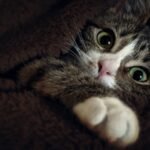Have you ever walked through your front door after a long day and wondered if your cat truly missed you—or if their look was just about the food bowl? The idea that our feline friends have emotional attachments, and might even wait for us, has fascinated cat lovers for generations. For anyone who cherishes the quiet companionship of a cat, discovering the subtle signs of their emotional longing is both heartwarming and a little mysterious. Imagine how touching it would be to realize your cat isn’t just waiting for their dinner, but for you. Let’s unravel the emotional secrets behind your cat’s behavior and learn how to recognize when your furry companion is genuinely waiting for you.
Understanding Feline Attachment

Many people assume that cats are independent creatures who don’t form deep bonds with humans. However, this couldn’t be further from the truth. Cats actually develop strong attachments to their owners, much like dogs or even young children. When a cat feels emotionally connected to a person, they may show signs of separation anxiety or anticipation for their return. This attachment is often built over time, through daily routines, gentle interactions, and shared experiences. Cats may not jump for joy the way a dog does, but their loyalty and affection can be just as profound. Recognizing this attachment is the first step in understanding if your cat is truly waiting for you. Once you spot the signs, it’s hard not to feel a sense of pride and warmth in knowing you matter so much to your furry friend.
Recognizing Waiting Behaviors

If you’ve noticed your cat lingering by the door or window around the time you usually come home, you may be witnessing a classic sign of emotional waiting. Some cats will even sit at the same spot for hours, anticipating their favorite human’s arrival. Others may pace or keep glancing toward the entrance, ears perked and alert. It’s not always about food; sometimes, your cat simply wants your presence. Cats are creatures of habit, and they often learn your schedule, adjusting their behavior to align with your routine. If you find your cat consistently greeting you or appearing just as you walk in, it’s a strong indicator that they’ve been waiting—emotionally and physically. Their patience can be both endearing and surprising, especially from a pet so often described as aloof.
Vocalizations and Communication

Cats have a unique way of expressing themselves, and vocalizations are a big part of their emotional language. When your cat meows, chirps, or trills as you return, it may be more than simple chatter. These sounds can be a form of greeting or excitement, signaling relief and happiness at your return. Some cats even develop a special “welcome home” meow, distinct from their usual vocalizations. Listen closely, and you might notice these sounds are different in tone or frequency when you’ve been away for a while. In addition, some cats will follow you around the house, meowing or making soft sounds, as if telling you about their day. This chatter is often a sign of emotional attachment and a desire to reconnect after your absence.
Physical Affection Upon Your Return

Physical affection is one of the most touching signs that your cat has been waiting for you. Does your cat rub against your legs, bump their head into your hand, or jump onto your lap the moment you walk in? These actions are more than just greetings—they’re expressions of love and emotional anticipation. Some cats may even knead on blankets or your clothes, a behavior rooted in kittenhood that signals comfort and trust. While every cat has a unique way of showing affection, repeated displays of closeness after you come home are a strong sign of emotional waiting. The warmth of their fur and the gentle purring can make any bad day melt away, reminding you of the special place you hold in their heart.
Changes in Routine or Behavior

Sometimes, a cat’s emotional waiting shows up not in what they do, but in how their behavior changes when you’re gone. If your usually playful cat becomes withdrawn or less active during your absence, it may be a sign of missing you. Some cats eat less, avoid their favorite spots, or seem restless until you return. These subtle shifts in routine can reveal just how much your presence matters to them. It’s important to pay attention to these changes, as they can also indicate stress or anxiety. When your return brings them back to their usual self, it’s a powerful sign of emotional connection and anticipation.
Following You Around the House

After you come back home, does your cat shadow your every move? Many cats will follow their owners from room to room after a separation, as if afraid to let you out of their sight again. This “velcro cat” behavior shows a deep desire for closeness and reassurance after time apart. Your cat may watch you cook, sit beside you during meals, or curl up in the same room as you relax. Such persistent following is a clear indication that your cat values your company and wants to make the most of your presence. It’s a silent but powerful way for your cat to say, “I missed you.”
Body Language and Eye Contact

Cats are experts at communicating with their bodies, and their subtle signals can speak volumes about their emotions. Look for soft, relaxed postures, slow blinking, and gentle tail movements when you return home. A cat that greets you with a high tail, exposed belly, or slow blinks is showing trust and affection. These are not just random gestures; they’re feline ways of expressing love and comfort. Prolonged eye contact, paired with a slow blink, is often called a “cat kiss”—a special sign of emotional bonding. If your cat displays these behaviors after a separation, you can be sure that your presence truly matters to them.
In every whisker twitch and gentle purr, your cat’s emotional world is waiting to be discovered.

Linnea is a born and bred Swede but spends as much time as possible in Cape Town, South Africa. This is mainly due to Cape Town’s extraordinary scenery, wildlife, and atmosphere (in other words, because Cape Town is heaven on earth.) That being said, Sweden’s majestic forests forever hold a special place in her heart. Linnea spends as much time as she can close to the ocean collecting sea shells or in the park admiring puppies.






